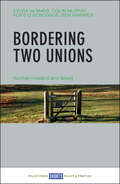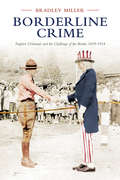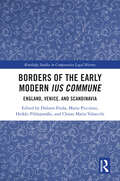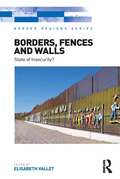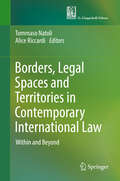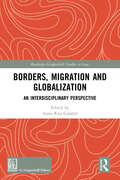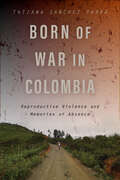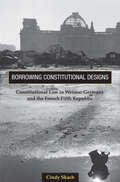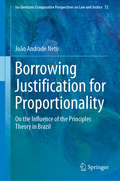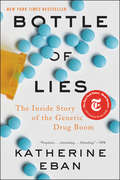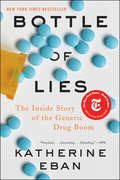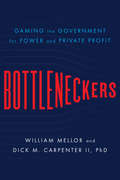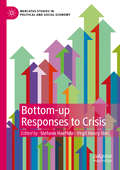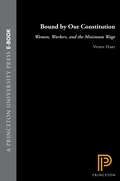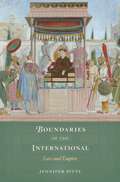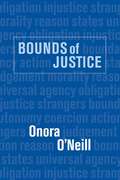- Table View
- List View
Bordering Two Unions: Northern Ireland and Brexit
by Colin Murray Sylvia De MarsAvailable Open Access under CC-BY-NC licence. How does Brexit change Northern Ireland’s system of government? Could it unravel crucial parts of Northern Ireland’s peace process? What are the wider implications of the arrangements for the Irish and UK constitutions? Northern Ireland presents some of the most difficult Brexit dilemmas. Negotiations between the UK and the EU have set out how issues like citizenship, trade, the border, human rights and constitutional questions may be resolved. But the long-term impact of Brexit isn’t clear. This thorough analysis draws upon EU, UK, Irish and international law, setting the scene for a post-Brexit Northern Ireland by showing what the future might hold.
Borderless Wars
by Antonia ChayesIn 2011, Nasser Al-Awlaki, a terrorist on the US 'kill list' in Yemen, was targeted by the CIA. A week later, a military strike killed his son. The following year, the US Ambassador to Pakistan resigned, undermined by CIA-conducted drone strikes of which he had no knowledge or control. The demands of the new, borderless 'gray area' conflict have cast civilians and military into unaccustomed roles with inadequate legal underpinning. As the Department of Homeland Security defends against cyber threats and civilian contractors work in paramilitary roles abroad, the legal boundaries of war demand to be outlined. In this book, former Under Secretary of the Air Force Antonia Chayes examines these new 'gray areas' in counterinsurgency, counter-terrorism and cyber warfare. Her innovative solutions for role definition and transparency will establish new guidelines in a rapidly evolving military-legal environment.
Borderline Crime: Fugitive Criminals and the Challenge of the Border, 1819-1914
by Bradley Miller The Osgoode SocietyFrom 1819 to 1914, governments in northern North America struggled to deal with crime and criminals migrating across the Canadian-American border. Limited by the power of territorial sovereignty, officials were unable to simply retrieve fugitives and refugees from foreign territory. Borderline Crime examines how law reacted to the challenge of the border in British North America and post-Confederation Canada. For nearly a century, officials ranging from high court judges to local police officers embraced the ethos of transnational enforcement of criminal law. By focusing on common criminals, escaped slaves, and political refugees, Miller reveals a period of legal genesis where both formal and informal legal regimes were established across northern North America and around the world to extradite and abduct fugitives. Miller also reveals how the law remained confused, amorphous, and often ineffectual at confronting the threat of the border to the rule of law. This engrossing history will be of interest to legal, political, and intellectual historians alike.
Borders of the Early Modern Ius Commune: England, Venice, and Scandinavia (Routledge Studies in Comparative Legal History)
by Dolores Freda, Mario Piccinini, Heikki Pihlajamäki, and Chiara Maria ValsecchiThe culture of the ius commune has been a unifying element of European and Western legal civilization. As shown by several recent studies, the influence of ius commune extended much farther than its traditional core area. This volume discusses the expansion and changes of ius commune in three significant corners of Europe, which in the classical narrative either totally or partially were left out of the picture: England, Scandinavia, and Venice. The study goes beyond the traditional question of the influence of ius commune in comparing the different constellations of normativity and legal pluralism in these regions. It investigates how not only ius commune but also other forms of normativity – such as customary law, written norms, and legal practice – were used and applied, and how they circulated. The approach helps create new narratives as to how the relationship between centers and peripheries in Europe evolved in the early modern period. These new narratives are built from bottom to top; thus, they are based on concrete source information, and they focus on the learned legal systems and their connection to the local legal sources. The collection further looks into the circulation of professors and doctors, students, and legal texts, starting from the idea that a theoretical understanding of the forms of normativity can emerge only through concrete, multidisciplinary research recognizing the tensions between global legal unification and differentiation. The book will be essential reading for researchers and academics in Legal History, Law and Religion, Comparative Legal Studies, and Early Modern History.
Borders, Fences and Walls: State of Insecurity? (Border Regions Series)
by Elisabeth ValletTwenty years after the fall of the Berlin Wall, the question remains ’Do good fences still make good neighbours’? Since the Great Wall of China, the Antonine Wall, built in Scotland to support Hadrian's Wall, the Roman ’Limes’ or the Danevirk fence, the ’wall’ has been a constant in the protection of defined entities claiming sovereignty, East and West. But is the wall more than an historical relict for the management of borders? In recent years, the wall has been given renewed vigour in North America, particularly along the U.S.-Mexico border, and in Israel-Palestine. But the success of these new walls in the development of friendly and orderly relations between nations (or indeed, within nations) remains unclear. What role does the wall play in the development of security and insecurity? Do walls contribute to a sense of insecurity as much as they assuage fears and create a sense of security for those 'behind the line'? Exactly what kind of security is associated with border walls? This book explores the issue of how the return of the border fences and walls as a political tool may be symptomatic of a new era in border studies and international relations. Taking a multidisciplinary approach, this volume examines problems that include security issues ; the recurrence and/or decline of the wall; wall discourses ; legal approaches to the wall; the ’wall industry’ and border technology, as well as their symbolism, role, objectives and efficiency.
Borders, Legal Spaces and Territories in Contemporary International Law: Within and Beyond
by Tommaso Natoli Alice RiccardiThis book examines the challenges posed to contemporary international law by the shifting role of the border, which has recently re-emerged as a central issue in international relations. It posits that borders do not merely correspond to States’ boundaries: indeed, while remaining a fundamental tool for asserting States’ power, they are in fact a collection of constantly changing spatial limits. Consequently, the book approaches borders as context-specific limits and revisits notions traditionally linked to them (jurisdiction, sovereignty, responsibility, individual rights), while also adopting the innovative approach of viewing borders as phenomena of both closedness and openness. Accordingly, the first part of the book addresses what happens “within” borders, investigating the root causes of the emergence of spatial limits and re-assessing apparent extra-territorial assertions of State power. In turn, the second part not only explores typical borderless spaces, but also more generally considers the exercise of States’ and international organisations’ powers and prerogatives across or “beyond” borders.
Borders, Migration and Globalization: An Interdisciplinary Perspective (Routledge-Giappichelli Studies in Law)
by Anna Rita CalabròThe emergence of new and substantial human migration flows is one of the most important consequences of globalisation. While ascribable to widely differing social and economic causes, from the forced migration of refugees to upper-middle-class migration projects and the movement of highly skilled workers, what they have in common is the effect of contributing to a substantial global redefinition in terms of both identity and politics. This book contains contributions from scholars in the fields of law, social sciences, the sciences, and the liberal arts, brought together to delineate the features of the migration phenomena that will accompany us over the coming decades. The focus is on the multifaceted concept of 'border' as representing a useful stratagem for dealing with a topic like migration that requires analysis from several perspectives. The authors discuss the various factors and issues which must be understood in all their complexity so that they can be governed by all social stakeholders, free of manipulation and false consciousness. They bring an interdisciplinary and comparative perspective to the social phenomena such as human trafficking, unaccompanied foreign minors, or ethnic-based niches in the job market. The book will be a valuable guide for academics, students and policy-makers.
Born Liars: Why We Can't Live Without Deceit
by Ian LeslieLying is an intrinsic part of our social fabric, but it is also a deeply problematic and misunderstood aspect of what makes us human. Ian Leslie takes us on a fascinating journey that makes us question not only our own relationship to the truth, but also virtually every daily encounter we have. On the way he dissects the history of the lie detector, how parents affect their children’s attitude to lying (and vice versa), Who Wants to Be a Millionaire?, the philosophical ambiguity of telling the truth, Bill Clinton’s presentational prowess, Wonder Woman’s lasso of truth, and why we should be wary of anyone with more than 150 Facebook friends. Born Liars is thought-provoking, anecdotally driven narrative nonfiction at its best. Ian Leslie’s intoxicating blend of anthropology, biology, cultural history, philosophy, and popular psychology belies a serious central message: that humans have evolved and thrived in large part because of their ability to deceive.
Born Well: Prenatal Genetics and the Future of Having Children (The International Library of Bioethics #88)
by Megan A. Allyse Marsha MichieThis book brings together an international collection of experts in reproductive ethics, law, disability studies, and medicine to explore the challenging future of reproduction and children. From the medical to the social and from the financial to the legal, the authors explore the expanding impact of reproductive genetics on our society. New advances in genetic technologies are revolutionizing the practice of reproductive medicine. We have expanded our ability to detect genetic changes in embryos and fetuses in ways that potentially allow to identify, treat, or prevent a growing range of diseases. The development of gene-editing technologies raises questions about the possibility of removing disease-causing variants from embryos before pregnancy implantation. The growing sophistication of prenatal genomic sequencing offers us glimpses into the whole genome of the developing fetus. And, the increasingly sophisticated science of 'gene matching' allows us greater and greater foreknowledge of how the genomes of two individuals will combine in a future child. This is an indispensable book on the newest developments in bioethics caused by the sciences.Chapter 5 is available open access under a Creative Commons Attribution 4.0 International License via link.springer.com.
Born of War in Colombia: Reproductive Violence and Memories of Absence (Genocide, Political Violence, Human Rights)
by Tatiana Sanchez ParraBorn of War in Colombia addresses why people born of conflict-related sexual violence remain unseen within transitional justice agendas. In Colombia, there are generations of children born of conflict-related sexual violence across the country. Whispers of their presence have traveled outside their communities. They also exist within the country’s domestic reparations program, which entitles them to reparations. Drawing on an immersive feminist ethnography with a community that endured a paramilitary confinement, the book reveals how a past-oriented and harm-centered model of transitional justice has converged with a restricted notion of gendered victimhood and the patriarchal politics of reproduction to render the bodies and experiences of people born of conflict-related sexual violence unintelligible to those seeking to understand and address the consequences of war in Colombia.
Borrowing Constitutional Designs: Constitutional Law in Weimar Germany and the French Fifth Republic
by Cindy SkachAfter the collapse of communism, some thirty countries scrambled to craft democratic constitutions. Surprisingly, the constitutional model they most often chose was neither the pure parliamentary model found in most of Western Europe at the time, nor the presidential model of the Americas. Rather, it was semi-presidentialism--a rare model known more generally as the "French type." This constitutional model melded elements of pure presidentialism with those of pure parliamentarism. Specifically, semi-presidentialism combined a popularly elected head of state with a head of government responsible to a legislature. Borrowing Constitutional Designs questions the hasty adoption of semi-presidentialism by new democracies. Drawing on rich case studies of two of the most important countries for European politics in the twentieth century--Weimar Germany and the French Fifth Republic--Cindy Skach offers the first theoretically focused, and historically grounded, analysis of semi-presidentialism and democracy. She demonstrates that constitutional choice matters, because under certain conditions, semi-presidentialism structures incentives that make democratic consolidation difficult or that actually contribute to democratic collapse. She offers a new theory of constitutional design, integrating insights from law and the social sciences. In doing so, Skach challenges both democratic theory and democratic practice. This book will be welcomed not only by scholars and practitioners of constitutional law but also by those in fields such as comparative politics, European politics and history, and international and public affairs.
Borrowing Justification for Proportionality: On the Influence of the Principles Theory in Brazil (Ius Gentium: Comparative Perspectives on Law and Justice #72)
by João Andrade NetoThe proportionality test, as proposed in Robert Alexy’s principles theory, is becoming commonplace in comparative constitutional studies. And yet, the question “are courts justified in borrowing proportionality?” has not been expressly put in many countries where judicial borrowings are a reality. This book sheds light on this question and examines the circumstances under which courts are authorized to borrow from alien legal sources to rule on constitutional cases.Taking the Supreme Federal Court of Brazil – and its enthusiastic recourse to proportionality when interpreting the Federal Constitution – as a case study, the book investigates the normative reasons that could justify the court’s attitude and offers a comprehensive overview of its case law on controversial constitutional matters like abortion, same-sex union, racial quotas, and the right to public healthcare.Providing a valuable resource for those interested in comparative constitutional law and legal theory, or curious about Brazilian constitutional law, this book questions the alleged universality of the proportionality test, challenges the premises of Alexy’s principles theory, and discloses more than 68 Brazilian Supreme Court decisions delivered from 2003 to 2018 that would otherwise have remained unknown to an English-speaking audience.
Bottle of Lies: The Inside Story of the Generic Drug Boom
by Katherine EbanFrom an award-winning journalist, an explosive narrative investigation of the generic drug boom that reveals fraud and life-threatening dangers on a global scale—The Jungle for pharmaceuticalsMany have hailed the widespread use of generic drugs as one of the most important public-health developments of the twenty-first century. Today, almost 90 percent of our pharmaceutical market is comprised of generics, the majority of which are manufactured overseas. We have been reassured by our doctors, our pharmacists and our regulators that generic drugs are identical to their brand-name counterparts, just less expensive. But is this really true?Katherine Eban’s Bottle of Lies exposes the deceit behind generic-drug manufacturing—and the attendant risks for global health. Drawing on exclusive accounts from whistleblowers and regulators, as well as thousands of pages of confidential FDA documents, Eban reveals an industry where fraud is rampant, companies routinely falsify data, and executives circumvent almost every principle of safe manufacturing to minimize cost and maximize profit, confident in their ability to fool inspectors. Meanwhile, patients unwittingly consume medicine with unpredictable and dangerous effects.The story of generic drugs is truly global. It connects middle America to China, India, sub-Saharan Africa and Brazil, and represents the ultimate litmus test of globalization: what are the risks of moving drug manufacturing offshore, and are they worth the savings? A decade-long investigation with international sweep, high-stakes brinkmanship and big money at its core, Bottle of Lies reveals how the world’s greatest public-health innovation has become one of its most astonishing swindles.
Bottle of Lies: The Inside Story of the Generic Drug Boom
by Katherine EbanA NEW YORK TIMES BESTSELLER New York Times 100 Notable Books of 2019New York Public Library Best Books of 2019 Kirkus Reviews Best Health and Science Books of 2019Science Friday Best Books of 2019 New postscript by the authorFrom an award-winning journalist, an explosive narrative investigation of the generic drug boom that reveals fraud and life-threatening dangers on a global scale—The Jungle for pharmaceuticalsMany have hailed the widespread use of generic drugs as one of the most important public-health developments of the twenty-first century. Today, almost 90 percent of our pharmaceutical market is comprised of generics, the majority of which are manufactured overseas. We have been reassured by our doctors, our pharmacists and our regulators that generic drugs are identical to their brand-name counterparts, just less expensive. But is this really true?Katherine Eban’s Bottle of Lies exposes the deceit behind generic-drug manufacturing—and the attendant risks for global health. Drawing on exclusive accounts from whistleblowers and regulators, as well as thousands of pages of confidential FDA documents, Eban reveals an industry where fraud is rampant, companies routinely falsify data, and executives circumvent almost every principle of safe manufacturing to minimize cost and maximize profit, confident in their ability to fool inspectors. Meanwhile, patients unwittingly consume medicine with unpredictable and dangerous effects.The story of generic drugs is truly global. It connects middle America to China, India, sub-Saharan Africa and Brazil, and represents the ultimate litmus test of globalization: what are the risks of moving drug manufacturing offshore, and are they worth the savings? A decade-long investigation with international sweep, high-stakes brinkmanship and big money at its core, Bottle of Lies reveals how the world’s greatest public-health innovation has become one of its most astonishing swindles.
Bottleneckers: Gaming the Government for Power and Private Profit
by Dick M. Carpenter II William MellorBottlenecker (n): a person who advocates for the creation or perpetuation of government regulation, particularly an occupational license, to restrict entry into his or her occupation, thereby accruing an economic advantage without providing a benefit to consumers.The Left, Right, and Center all hate them: powerful special interests that use government power for their own private benefit. In an era when the Left hates "fat cats" and the Right despises "crony capitalists," now there is an artful and memorable one-word pejorative they can both get behind: bottleneckers.A "bottlenecker" is anyone who uses government power to limit competition and thereby reap monopoly profits and other benefits. Bottleneckers work with politicians to constrict competition, entrepreneurial innovation, and opportunity. They thereby limit consumer choice; drive up consumer prices; and they support politicians who willingly overstep the constitutional limits of their powers to create, maintain, and expand these anticompetitive bottlenecks.The Institute for Justice's new book Bottleneckers coins a new word in the American lexicon, and provides a rich history and well-researched examples of bottleneckers in one occupation after another-from alcohol distributors to taxicab cartels-pointing the way to positive reforms.
Bottom-up Responses to Crisis (Mercatus Studies in Political and Social Economy)
by Virgil Henry Storr Stefanie HaeffeleCrises occur in all societies across world, and can be natural (such as hurricanes, flooding, and earthquakes), man-made (such as wars and economic downturns), or, often, a combination of both (such as famines, the flooding of New Orleans in 2005 after Hurricane Katrina and subsequent levy failures, and the earthquake, tsunami, and nuclear disaster in Japan in 2011). Crises cause fatalities, injuries, and property damages as well as introduce uncertainty and challenges for individuals, societies, and polities. Yet, we see individuals and communities rebounding effectively from crises all the time. How do communities go about returning to normalcy and beginning again the mundane life of every day affairs? This edited volume looks at bottom-up responses to crises. The chapters in this volume will highlight the ingenuity and persistence of individuals and private organizations as well as discuss the possibilities, limitations, and adaptability of bottom-up responses. It argues that there are many ways that local leaders, entrepreneurs, and community members can play a role in their own recovery by examining the capabilities, feedback mechanisms, and network effects of decentralized crisis response and recovery efforts. Chapters will focus on the role of local emergency managers in the disaster management process and offer suggestions for reform and the role of businesses, citizens, and children in providing crisis response and recovery. This book will also consider theories of self-governance and nonviolent action in encouraging and sustaining bottom-up recovery.
Bound By Honor
by Gary Smalley Greg SmalleyGary and Greg Smalley are psychologists as well as father and son. They share insights from their relationship as well as their experience with their clients. They teach parents how to create a loving, respectful, and nurturing relationship with teenagers. Topics include offering loving discipline, handling the family car, dating, and letting go as teens reach adulthood.
Bound by Our Constitution: Women, Workers, and the Minimum Wage (Princeton Studies in American Politics: Historical, International, and Comparative Perspectives #40)
by Vivien HartWhat difference does a written constitution make to public policy? How have women workers fared in a nation bound by constitutional principles, compared with those not covered by formal, written guarantees of fair procedure or equitable outcome? To investigate these questions, Vivien Hart traces the evolution of minimum wage policies in the United States and Britain from their common origins in women's politics around 1900 to their divergent outcomes in our day. She argues, contrary to common wisdom, that the advantage has been with the American constitutional system rather than the British.Basing her analysis on primary research, Hart reconstructs legal strategies and policy decisions that revolved around the recognition of women as workers and the public definition of gender roles. Contrasting seismic shifts and expansion in American minimum wage policy with indifference and eventual abolition in Britain, she challenges preconceptions about the constraints of American constitutionalism versus British flexibility. Though constitutional requirements did block and frustrate women's attempts to gain fair wages, they also, as Hart demonstrates, created a terrain in the United States for principled debate about women, work, and the state--and a momentum for public policy--unparalleled in Britain. Hart's book should be of interest to policy, labor, women's, and legal historians, to political scientists, and to students of gender issues, law, and social policy.
Boundaries and Allegiances: Problems of Justice and Responsibility in Liberal Thought
by Samuel SchefflerThis book is a collection of eleven essays by one of the most interesting moral philosophers. It examines challenges to liberal thought posed by the changing circumstances of the modern world such as the conflicting tendencies toward global integration, and greater ethnic and communal identification. The author considers whether liberal principles of justice can accommodate social and global interdependencies while reaffirming the importance of individual responsibility and acknowledging the significance of people's diverse personal and communal allegiances.
Boundaries and Secession in Africa and International Law
by Dirdeiry M. AhmedThis book challenges a central assumption of the international law of territory. The author argues that, contrary to the finding in the Frontier Dispute case, uti possidetis is not a general principle of law enjoining states to preserve pre-existing boundaries on state succession. It demonstrates that African state practice and opinio juris gave rise to customary rules that govern sovereign territory transfer in Africa. It explains that those rules changed international law as it relates to Africa in many respects, leading chiefly to creating norms of African jus cogens prohibiting secession and the redrawing of boundaries. The book examines in-depth the singularity of secession in Africa exploring extensive state practice and case law. Finally, it advances a daring argument for a right to egalitarian self-determination, addressing people-to-people domination in multi-ethnic African states, to serve as an exception to the fast special customary rule against secession.
Boundaries of Loyalty
by Berman Saul J.Talmudic legislation prescribed penalty for a Jew to testify in a non-Jewish court, against a fellow Jew, to benefit a gentile - for breach of a duty of loyalty to a fellow Jew. Through close textual analysis, Saul Berman explores how Jewish jurists responded when this virtue of loyalty conflicted with values such as Justice, avoidance of desecration of God's Name, deterrence of crime, defence of self, protection of Jewish community, and the duty to adhere to Law of the Land. Essential for scholars and graduate students in Talmud, Jewish law and comparative law, this key volume details the nature of these loyalties as values within the Jewish legal system, and how the resolution of these conflicts was handled. Berman additionally explores why this issue has intensified in contemporary times and how the related area of 'Mesirah' has wrongfully come to be prominently associated with this law regulating testimony.
Boundaries of the International: Law and Empire
by Jennifer PittsIt is commonly believed that international law originated in relations among European states that respected one another as free and equal. In fact, as Jennifer Pitts shows, international law was forged at least as much through Europeans’ domineering relations with non-European states and empires, leaving a legacy still visible in the unequal structures of today’s international order. Pitts focuses on the eighteenth and nineteenth centuries, the great age of imperial expansion, as European intellectuals and administrators worked to establish and justify laws to govern emerging relationships with non-Europeans. Relying on military and commercial dominance, European powers dictated their own terms on the basis of their own norms and interests. Despite claims that the law of nations was a universal system rooted in the values of equality and reciprocity, the laws that came to govern the world were parochial and deeply entangled in imperialism. Legal authorities, including Emer de Vattel, John Westlake, and Henry Wheaton, were key figures in these developments. But ordinary diplomats, colonial administrators, and journalists played their part too, as did some of the greatest political thinkers of the time, among them Montesquieu and John Stuart Mill. Against this growing consensus, however, dissident voices as prominent as Edmund Burke insisted that European states had extensive legal obligations abroad that ought not to be ignored. These critics, Pitts shows, provide valuable resources for scrutiny of the political, economic, and legal inequalities that continue to afflict global affairs.
Bounded Rationality and Economic Diplomacy
by Skovgaard Poulsen, Lauge N.Modern investment treaties give private arbitrators power to determine whether governments should pay compensation to foreign investors for a wide range of sovereign acts. In recent years, particularly developing countries have incurred significant liabilities from investment treaty arbitration, which begs the question why they signed the treaties in the first place. Through a comprehensive and timely analysis, this book shows that governments in developing countries typically overestimated the economic benefits of investment treaties and practically ignored their risks. Rooted in insights on bounded rationality from behavioural psychology and economics, the analysis highlights how policy-makers often relied on inferential shortcuts when assessing the implications of the treaties, which resulted in systematic deviations from fully rational behaviour. This not only sheds new light on one of the most controversial legal regimes underwriting economic globalization but also provides a novel theoretical account of the often irrational, yet predictable, nature of economic diplomacy.
Bounds Of Justice
by Onora O'NeillIn this collection of essays Onora O'Neill explores and argues for an account of justice that is fundamentally cosmopolitan rather than civic, yet takes serious account of institutions and boundaries, and of human diversity and vulnerability. Starting from conceptions that are central to any account of justice - those of reason, action, judgement, coercion, obligations and rights - she discusses whether and how culturally or politically specific concepts and views, which limit the claims and scope of justice, can be avoided. She then examines the demands and scope of just institutions, arguing that there are good reasons for taking the claims of distant strangers seriously, but that doing so points not to a world without boundaries but to one of porous boundaries and dispersed power. Bounds of Justice will be of interest to a wide range of readers in philosophy, politics and international relations.
Bourbon Justice: How Whiskey Law Shaped America
by Fred Minnick Brian F. HaaraBourbon whiskey has made a surprising contribution to American legal history. Tracking the history of bourbon and bourbon law illuminates the development of the United States as a nation, from conquering the wild frontier to rugged individualism to fostering the entrepreneurial spirit to solidifying itself as a nation of laws. Bourbon is responsible for the growth and maturation of many substantive areas of the law, such as trademark, breach of contract, fraud, governmental regulation and taxation, and consumer protection. In Bourbon Justice Brian Haara delves into the legal history behind one of America’s most treasured spirits to uncover a past fraught with lawsuits whose outcome, surprisingly perhaps, helped define a nation. Approaching the history of bourbon from a legal standpoint, Haara tells the history of America through the development of commercial laws that guided our nation from an often reckless laissez-faire mentality, through the growing pains of industrialization, and past the overcorrection of Prohibition. More than just true bourbon history, this is part of the American story.
